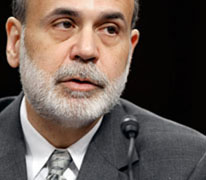Growing calls for interest-rate hike: "C'mon, Ben!"
 Washington - The front page of weekly magazine Barron's is one of the most respected in the financial world, yet it's latest headline was uncharacteristically political.
Washington - The front page of weekly magazine Barron's is one of the most respected in the financial world, yet it's latest headline was uncharacteristically political.
"It's time to raise rates, Ben," reads the unambiguous call to US Federal Reserve Chairman Ben Bernanke. It comes as the world's largest economy is only just beginning to climb out of its worst recession in decades.
While nobody expects rates to be raised before the middle of next year, it is clear that a debate is already raging. Even within the US central bank, two camps have reportedly emerged: "Hawks" who would raise interest rates sooner rather than later, and "doves" that would prefer to wait to tighten monetary policy.
It has been 10 months since the Federal Reserve slashed its benchmark federal funds rate to an historic low of 0-0.25 per cent, part of a dramatic effort to rescue the United States from a massive economic and financial crisis.
"C'mon, Ben!" shouts Barron's 10 months later. "There's no need for short-term rates to remain near zero now that the economy is recovering."
Andrew Bary, author of the article, cites as a sign of the recovery that the Dow Jones Industrial Average passed 10,000 points last week. Other arguments: low rates are fuelling financial speculation while "angering" foreign economies, creditors and domestic savers. It is also encouraging inflation.
If the United States wants to remain a haven for foreign capital, it had better work to strengthen the dollar, Bary writes. The dollar index, which gauges the US currency against a basket of 14 currencies, dropped to its lowest point in 14 months.
The main reason for the dollar's fall is that investors, who retreated to the relative safety of the dollar during the recession, are beginning to take risks again as the economy recovers.
At the same time, the difference between interest rates in the United States and those in other countries is growing, though the benchmark rate in the eurozone has also been lowered to 1 per cent.
Barron's advises returning short-term rates to a more "normal" 2 per cent, which would still be low by historical standards. Otherwise, the Fed "risks fostering another financial bubble."
Bernanke's predecessor, Alan Greenspan, took some blame for the financial crisis by keeping interest rates too low throughout this decade, fuelling a massive housing bubble that sparked the financial and economic collapse.
"We emphatically disagree," shot back a study by experts Andrew Tilton and Ed McKelvey of investment bank Goldman Sachs. Recovering markets and a weakening dollar are "just what the doctor ordered to confront the biggest recession in more than a half-century."
Inflation is likely to remain low through much of next year, they argue. Encouraging savings is "the last thing we need in the very short term if the economy is to expand."
The weak dollar is not especially alarming, though they acknowledge that a sharp sell-off might be cause for concern.
"Gradual weakening should improve the competitiveness of US exports abroad, help reduce the US trade deficit, and ultimately contribute to a constructive rebalancing of global supply and demand," write Tilton and McKelvey.
The last statements from the Fed itself suggest any rate hike is still a long ways away: Its official line from September is that the weak economy is "likely to warrant exceptionally low levels of the federal funds rate for an extended period."
But the debate between the Fed's hawks and doves is gathering steam, and signs of the dispute emerged this month.
Thomas Hoenig, head of the Federal Reserve Bank of Kansas City, signalled that he was growing impatient, telling a group of executives: "My experience tells me that we will need to remove our very accommodative policy sooner rather than later."
New York Fed President William Dudley disagrees, telling his hawkish colleagues that inflation concerns are "not well founded." Unemployment remains high and rising, while consumer demand has yet to recover from the shock of falling stocks and housing prices.
Dudley and Bernanke will be waiting for clearer signs of a recovery before closing the tap on low interest rates. (dpa)